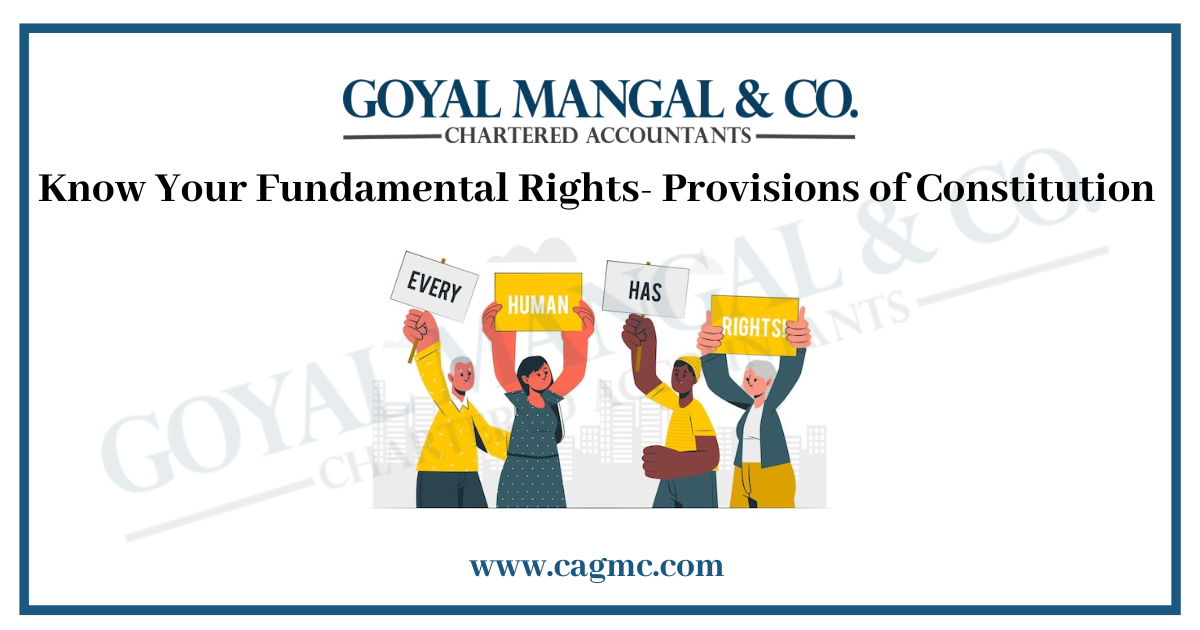 The Indian Constitution was adopted by the Constituent Assembly on November 26, 1949. It includes the structure and fundamental codes which signify India as a Republic with an organized democracy. Fundamental rights are a brief section of this framework, which provides security to the citizens and also clarify their duties.
The Indian Constitution was adopted by the Constituent Assembly on November 26, 1949. It includes the structure and fundamental codes which signify India as a Republic with an organized democracy. Fundamental rights are a brief section of this framework, which provides security to the citizens and also clarify their duties.
|
Table of Content |
Abstract
Fundamental rights are secured statutory rights which are guaranteed to all the citizens of the country and they are enshrined under the Constitution of India. They are applied without any discrimination based on religion, race, caste or gender, etc.
Fundamental rights are enforceable by the Indian courts and are considered inherent in the citizens. Such rights cannot be taken away even by the State. The fundamental rights are also called Natural Rights which hold higher sanctity in comparison to any other statutory or legal rights.
Schedules
The Fundamental Rights have been categorized into the following six groups under the Constitution of India:
- Right to Equality (enshrined under Articles 14 to 18)
- Right to Freedom (enshrined under Articles 19 to 22)
- Rights against Exploitation (enshrined under Articles 23 and 24)
- Right to Freedom of Religion (enshrined under Articles 25 to 28)
- Cultural and Educational Rights (enshrined under Articles 29 and 30)
- Right to Constitutional Remedies (enshrined under Article 32)
*Article 31 was repealed*
Features
Fundamental Rights that are guaranteed by the Constitution of India have several unique features that can be compiled as follows;
- Some Fundamental rights are available only to Indian Citizens, while some are available to every individual irrespective of citizenship,
- Some Fundamental Rights are also available to Corporations and Companies,
- Fundamental Rights are not absolute, these are of qualified nature, and reasonable restrictions on these rights can be imposed by State,
- Fundamental Rights are defended by the Supreme Court of India which means “In case of infringement of Rights, the aggrieved party can directly move to the Hon’ble Supreme Court”,
- During a National Emergency, Fundamental Rights can be suspended (except the Fundamental Rights under Articles 20 and 21),
- If under abnormal circumstances, a military rule is imposed for the restoration of order, the application of Fundamental Rights can be restricted (Article 34),
- Parliament can also restrict or abrogate fundamental Rights (Article 33)
Importance of Fundamental Rights
The Fundamental Rights are important because they protect the secular fabric of the Nation. Apart from it such rights also act as;
- A Defensive wall for the liberty of individuals,
- Safeguard the interest of minorities,
- Ensure the respect and dignity of Individuals, and
- Create the foundation of the democratic system for the country
Fundamental Rights of Indian Citizen
The six categories of Fundamental Rights provided by the Constitution of India, which safeguard your rights as an Individual and Citizen of India, are as follows;
Right To Equality (Article 14-18): The Right to equality ensures equality for each citizen and that every citizen is the same under the eyes of the law. Any individual irrespective of gender, age, creed, caste, language, religion, and social/economic status is considered equal.
These Rightsensure that all persons are treated equally without discrimination. The following Articles establish the Right to equality under the Constitution of India;
- Article 14: Equality before the law,
- Article 15: Prohibition of discrimination on grounds of religion, sex, caste, race, or place of birth,
- Article 16: Equal opportunities in the public sector,
- Article 17: Abolition of untouchability,
- Article 18: Abolition of titles
Right To Freedom (Article 19-22)
The Right to Freedom ensures that the citizens live peacefully without any undue influence, restriction, or harassment by the respective Government.
(2.1)Article 19: This Article provides six types of Freedom to the Individuals, which are;
- Freedom of Speech and Expression,
- Freedom to peacefully assemble (without arms),
- Freedom to form Unions, Associations, or Societies,
- Freedom to freely move throughout the Nation,
- Freedom to Settle and reside within any part of the country, and
- Freedom to carry on any occupation or practice any profession, trade, or business of choice
(2.2) Article 20: Protection from a conviction for offenses,
(2.3) Article 21: Protection of life and liberty,
(2.4) Article 22: Protection against detention and arrest in certain cases
Right Against Exploitation (Article 23-24)
The Constitution of India provides Citizens with rights against exploitation or misuse of powers by the Authorities. Such Rights against exploitation protect Children, Indigent and vulnerable people from bonded or child labor and trafficking.
The following Articles ensure the Right against exploitation for the citizens;
(3.1) Article 23: Prohibition of human trafficking and forced labor,
(3.2) Article 24: Prohibition of child labor
Right To Freedom Of Religion (Article 25-28)
India recognizes different faiths and a diversity of religions. People in India follow different diverse religions and live in peace and harmony. Indians can practice the religion of their choice and perform such rituals that their customs respectively provide.
According to the Constitution of India, all religions are equal and no religion has a comparative priority over the other. Indian Citizens are free to, and any religion of their choice.
The following Articles of the Constitution of India ensure the Right to follow, propagate, practice, and preach the religion of choice;
(4.1) Article 25: Freedom to practice and follow the religion of choice,
(4.2) Article 26: Freedom in managing affairs that are religious in nature,
(4.3) Article 27: Freedom in paying tax in promotion of any religion,
(4.4) Article 28: Freedom to attend religious worship in educational institutions
Cultural and Educational Rights(Article 29-30)
The Cultural and Education Rights safeguard the customs and rights of minorities. The Constitution of India provides the Right to develop and conserve unique scripts and languages of any community.
The following Articles of the Constitution of India safeguard educational and cultural rights;
(5.1) Article 29: Protection of minority’s interests,
(5.2) Article 30: Right to establish and administer educational institutions by minorities
Right To Constitutional Remedies(Article 32)
Right to Constitution Remedies provides citizens with the remedy to approach the court in case of any infringement or denial of any Fundamental Right. This Right also empowers Courts to safeguard and preserve the Fundamental Rights of the citizens;
- Article: 32: Remedies for enforcing rights (Writs)
The five types of writs that protect the rights are:
- Habeas Corpus
- Mandamus
- Prohibition
- Certiorari and
- Quo-Warranto
Remedies when Fundamental Rights are violated (Article 32)
The Right to Constitutional Remedies provides effect to other rights. If the rights of citizens are violated by Government, private bodies, or by fellow citizens, then such rights would come to rescue.
Hon’ble Supreme Court or the Hon’ble High Court of the concerned state can be approached when any Fundamental Rights are violated. The Right to Constitutional Remedies is known as ‘The heart and Soul’ of the Constitution of India as they entirely safeguard all the Fundamental Rights and provide a combined remedy to approach the court of law by way of writs.
Can your Fundamental Rights be suspended?
Suspension of Fundamental Rights can only be done during a national emergency. However, the Rights enshrined under Articles 20 and 21 (Right to Life and Personal Liberty & Right against conviction) cannot be suspended even in case of a National Emergency.
Recent Cases
Fundamental Rights have been duly protected by precedents and judicial pronouncements. Below is the list of some of the cases by which courts of law protected the rights and clarified its view for further reference;
- The Secretary, Ministry of Defense v. Babita Puniya & Ors.: The Hon’ble Supreme Court in this case directed that “All women officers in the Short Service Commission shall be granted Permanent Commission irrespective of their service tenure”.
This judgment provided protection to female officers by establishing gender equality by providing Permanent Commissions to the female officers in the armed forces in the Indian Army, Indian Navy, and Indian Air Force.
This judgment enabled the commitment to the dignity and equality of women in all spheres. - Siddaraju v. the State of Karnataka: This case revolves around the matters related to “The persons with Disabilities Act, 1995”. The issue raised in this case was that specially-abled persons shall be given reservations in promotion. The Hon’ble Supreme Court further directed the union to reserve up to 3% for people with disabilities.
- Anuradha Bhasin v. Union of India: In this case, the Hon’ble Supreme Court addressed several issues such as ‘the validity of the order passed under section 144, Cr. P.C 1973 and degree of enforcement of Rights under Article 19. It was considered in this case that freedom of the Press and the Right to the Internet under Article 19 cannot be unnecessarily suspended, and The Freedom of the Press can be revoked if there exists reasonable apprehension of danger.
- ArnabRanjanGoswami v. Union of India: In this recent case, the court held that the right under Article 19 is not absolute and such rights are answerable to the legal system. It was also held that the Right of a Journalist to express freely is no higher than the Right of a Citizen to free speech and expression with reference to Article 19(1)(a).
Way Forward
The Fundamental Rights are included in the Constitution of India to consider the development of the individuality of each and every person and uphold their dignity and respect.
Fundamental Rights (FRs) preserve human dignity and respect. Most of the Fundamental Rights are enforceable against the state, while some of the rights can be directly enforced against both individuals and State.
One of the most important factors of the Fundamental Rights is that it provides Judiciary with a clear vision and guideline for regulating relations between the Government and the citizens.







